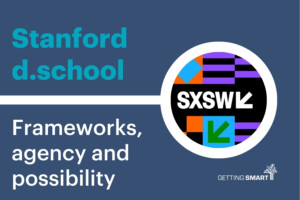How the President-Elect Can Scale Personalized Learning

By Lillian Pace
Presidential transitions can be a time of uncertainty and a time of opportunity. At KnowledgeWorks, we believe the new Administration has an incredible opportunity to leverage as it considers a strategy for transforming the nation’s K-12 and higher education systems. Local innovators are eager to advance new ideas for education reform, but they need a partner in the federal government willing to empower their visions for reform.
In our transition memo, Embracing the Opportunity: Recommendations for Scaling Personalized Learning Under a New Presidential Administration, we offer a set of recommendations for leveraging national momentum to create a flexible, customized education system where every learner succeeds.
We strongly encourage the incoming Trump Administration to prioritize the following ideas in its education agenda. Make sure to view our full transition memo for specific strategies on how to advance each of these ideas.
- Incentivize effective transitions between K–12 and higher education to increase college enrollment and persistence. With only 40% of 18- to 24-year-olds enrolling in college, and one-third of those learners placing into remedial coursework, the new Administration must improve the transition between the nation’s K–12 and higher education systems. A federal strategy must remove barriers to college access and create seamless pathways to attainment of a postsecondary credential and meaningful employment.
- Help states and districts scale K–12 personalized learning systems. The new Administration should partner with the increasing number of State and district leaders who have adopted a vision for personalized learning and have begun the hard work to build student-centered education systems. These leaders can benefit from the flexibility to innovate, the resources to build something new, and national leadership to help them replicate effective strategies at scale.
- Support personalized learning pathways toward a postsecondary credential by making the federal financial aid system more flexible. A new Administration should modernize the federal financial aid system to reflect the realities of today’s postsecondary learner. Traditional 12 credit-a-semester, full-time enrollment in postsecondary education is no longer the norm as individuals increasingly seek access to postsecondary opportunities as early as middle or high school, while working and raising a family, or later in life as part of a career change. We recommend an overhaul of the Federal financial aid system to ensure it is more flexible, better able to address changing career requirements, and reflective of the nation’s increasing interest in personalized education.
- Establish a cross-cutting priority for federal grants focused on personalized learning. A new Administration can help states, districts, and other education stakeholders invest in and expand high-quality personalized learning initiatives by establishing a priority for discretionary grant programs focused on personalized learning. An emphasis on personalized learning will ensure federal resources support high-impact strategies with the potential to close achievement gaps and ensure all students succeed.
We look forward to working with the new Administration to create a policy platform that makes it easier for learners to access high-quality, customized pathways to college and career success. In a time of uncertainty, there is no better strategy than to build on our strengths. By empowering our local innovators, we can turn their energy and dedication into a system that works for all.
This post originally ran on Knowledgeworks.
For more, see:
- 6 Strategies for Teaching Public Policy
- The State of our Nation’s EdTech: How Schools are Changing
- Overhauling How We Teach Our Kids in a World of Accelerating Change
Lillian Pace is the Senior Director of National Policy with KnowledgeWorks. Follow her on Twitter: @lillianpace
Stay in-the-know with all things EdTech and innovations in learning by signing up to receive the weekly Smart Update.




0 Comments
Leave a Comment
Your email address will not be published. All fields are required.